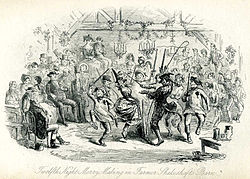Twelfth Night (holiday)
| Twelfth Night | |
|---|---|

Mervyn Clitheroe's Twelfth Night party,
by "Phiz" |
|
| Observed by | Christians |
| Type | Christian |
| Significance | evening prior to Epiphany |
| Observances | Singing Christmas carols, chalking the door, merrymaking, having one's house blessed, attending church services |
| Date | 5 or 6 January |
| Frequency | annual |
| Related to |
Twelve Days of Christmas Christmastide Epiphany Epiphanytide |
Twelfth Night is a festival in some branches of Christianity marking the coming of the Epiphany. Different traditions mark the date of Twelfth Night on either 5 January or 6 January; the Church of England, Mother Church of the Anglican Communion, celebrates Twelfth Night on the 5th and "refers to the night before Epiphany, the day when the nativity story tells us that the wise men visited the infant Jesus". In Western Church traditions, the Twelfth Night concludes the Twelve Days of Christmas; although, in others, the Twelfth Night can precede the Twelfth Day.Bruce Forbes writes:
In 567 the Council of Tours proclaimed that the entire period between Christmas and Epiphany should be considered part of the celebration, creating what became known as the twelve days of Christmas, or what the English called Christmastide. On the last of the twelve days, called Twelfth Night, various cultures developed a wide range of additional special festivities. The variation extends even to the issue of how to count the days. If Christmas Day is the first of the twelve days, then Twelfth Night would be on January 5, the eve of Epiphany. If December 26, the day after Christmas, is the first day, then Twelfth Night falls on January 6, the evening of Epiphany itself.
A belief has arisen in modern times, in some English-speaking countries, that it is unlucky to leave Christmas decorations hanging after Twelfth Night, a tradition originally attached to the festival of Candlemas (2 February), which celebrates the Presentation of Jesus at the Temple. Other popular Twelfth Night customs include singing Christmas carols, chalking the door, having one's house blessed, merrymaking, as well as attending church services.
...
Wikipedia
